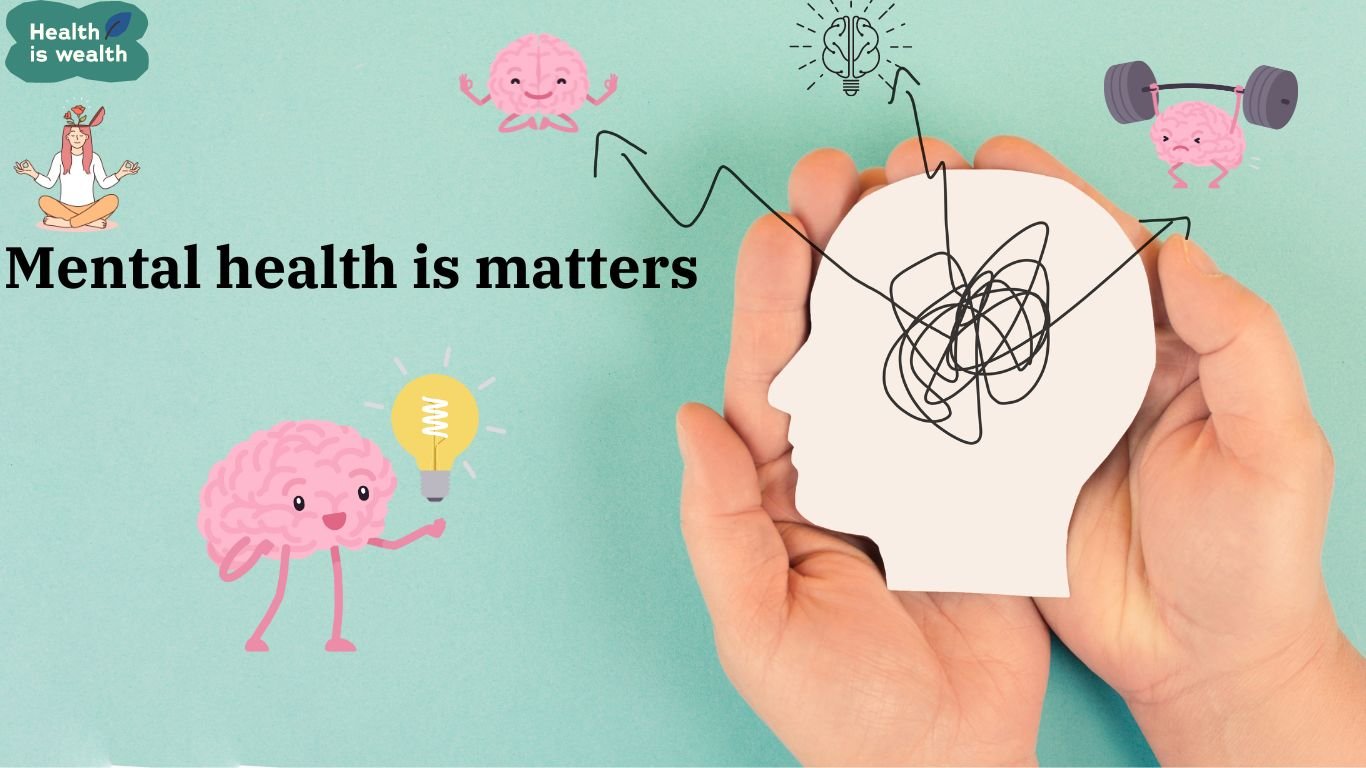Mental health encompasses an individual’s emotional, psychological, and social wellbeing, enabling them to realize their potential, cope with everyday stress, and function effectively.

Basics of mental health :
WHO’s world mental health report transforming mental health for all called on all countries to accelerate progress towards implementing plan by given to mental health, prevention and community services .Mental Health is a important aspect of our wellbeing yet its often misunderstood. shockingly statics reveal that 1 in 5 adult experience mental illness in every year. this mean that million of individuals word wild with condition such as depression anxiety bipolar disorder and more daily live and relation understanding the prevalence of mental health issue underscore importance of awareness reducing stigma and promoting access to support to need we can create a more compassionate and inclusive society .
Mental health is an important aspect of our overall wellbeing, yet it is often misunderstood. Shockingly, statistics reveal that one in five adults experiences mental illness every year. This means that millions of individuals worldwide live with conditions such as depression, anxiety, bipolar disorder, and more, affecting their daily lives and relationships.
Understanding the prevalence of mental health issues underscores the importance of awareness, reducing stigma, and promoting access to the support needed. By doing so, we can create a more compassionate and inclusive society.
What is meaning of mental health ?
Mental health refers to a person’s psychological, emotional, and social well-being. It encompasses various aspects of life, including how individuals think, feel, and behave. Good mental health means being able to deal with the normal stresses of life, work productively, build positive relationships with others, make decisions, and realize one’s potential.
It is not merely the absence of mental illness, but also the presence of positive traits such as resilience, self-esteem, and emotional intelligence. Mental health is influenced by biological, environmental, and social factors and is essential for overall health and quality of life.
Mental health conditions encompass a range of mental disorders, psychological disabilities, and other mental states that cause significant distress, impairment in functioning, or pose a risk of self-harm. People with mental health conditions are more likely to experience lower levels of mental well-being, although this is not always the case.
Past History of mental health :
In ancient times, mental health was often attributed to supernatural causes or divine punishment. Treatment was limited to prayer or other supernatural remedies, with little emphasis on physical care. During the Middle Ages, mental health was viewed as a moral weakness, and those with mental illnesses were often seen as possessed by evil spirits. Asylums were established to provide care for the mentally ill, but their approach was largely influenced by religious beliefs.
In the 19th century, there was significant progress in the understanding and treatment of mental health. The development of moral treatment and the establishment of asylums focused on providing care rather than containment.
Psychiatry began to be seen as a medical specialty, and the rise of institutions dedicated to mental health led to further advancements in the field. The understanding of mental illnesses, including the development of psychotherapy and other treatments, continued to evolve throughout the 20th century and beyond.

Risk factor affecting mental health :
Various risk factors can have an impact on one’s mental health. Psychological and social factors are the primary contributors to these factors.
Some of the key elements that are associated with mental health disorders include genetic and family history. People with a history of mental health conditions in their families are more likely to develop similar disorders.
It is important to remember that experiencing traumatic events, such as explosions, physical or emotional abuse, violence, can increase the risk of developing mental health disorders such as PTSD, depression, and chronic diseases. Prolonged exposure to such events can be tough to handle. In addition, other stressors such as work-related stress, financial difficulties, ongoing family complaints, can contribute to the development of mental health problems.
Brain chemistry and neurobiology, including alcohol, prescription medication, meditation, and triggers, can affect mental health. Chronic illness and physical limitations can also impact mental health and increase anxiety.
Chronic illness is a condition that causes significant physical pain and limitations, impacting mental health and increasing factors of anxiety.
Social isolation or loneliness, lack of social support, or taking a loan can contribute to feelings of depression and anxiety. Traumatic brain injuries (TBI) resulting from accidents or falls can be dangerous, leading to cognitive impairment and mental health issues.
Family history and adverse experiences during early childhood can increase the risk of developing mental health issues, but they do not guarantee that an individual will develop them. Protective factors such as strong social support, coping skills, access to mental health care, and healthy lifestyle habits can help reduce the risk of mental health issues.
Types of Mental disorders :
- Mood Disorders : Depression is characterized by persistent feelings of sadness, hopelessness, and loss of interest in activities. Bipolar disorder alternates periods of depression and mania, characterized by elevated mood, impulsivity, and increased energy.
- Anxiety disorders: specifically Generalized Anxiety Disorder (GAD), involve excessive worry and anxiety about various aspects of life without any specific triggers. Panic disorder is marked by sudden episodes of physical symptoms such as chest tightness and shortness of breath, as well as intense, irrational fears of specific objects or situations.
- Psychological disorder screening can identify mental disorders characterized by delusions, disorganized thinking, and impaired social functioning.
- Personality disorders: are a group of mental health conditions that affect a person’s way of thinking, feeling, and behaving. Borderline personality disorder (BPD) is characterized by unstable relationships, impulsive behavior, and a fragile sense of self. Dependent personality disorder (DPD) is characterized by a strong need to be taken care of, fear of being alone, and difficulty making decisions. Antisocial personality disorder (ASPD) is characterized by a disregard for the rights of others, along with a lack of empathy and remorse.
- Trauma And stress related disorder post traumatic stress disorder PTSD develop after experience witness Traumatic event , acute stress disorder similar PTSD but occur within 1 month traumatic for short and duration.
Sign of mental health :
- Emotional resilience refers to the ability to effectively cope with life’s challenges and bounce back from setbacks without becoming overwhelmed.
- Having positive relationships with friends, family, and peers is important, as is maintaining healthy boundaries.
- Develop a coping strategy that utilizes healthy cooking methods, problem-solving skills, seeks social support, and engage in hobbies or relaxation techniques to manage stress.
- sense of purpose and meaning can be found through relationships, hobbies, personal goals, and a fulfilling career.
- Having self-awareness means having insight into one’s own thoughts, feelings, and behaviors, as well as being able to recognize and manage one’s own emotions and thought patterns in a constructive way.
- “Adaptability is the ability to adjust to new situations and challenges with flexibility. It involves being able to change and regulate anything from the dollar rate to yourself.”
Diagnosis :
Diagnosis mental health condition typically evolves comprehensive assessment conducted by mental health professional such as psychiatrist psychologist or lesson therapist evolved diagnosing mental health disorders first clinician interview with individual gather information about their symptoms medical history family
Physical examination of physical examination maybe conducted to rule out any underline medical condition that could be contributing the symptoms and mental health condition can have physical manifestation or influence by Physical health factor.
psychological assessment psychological assessment standard question minister to evaluate specific symptoms personality traits cognitive abilities emotional functioning assessment help in making accurate diagnosis treatment
Cultural consideration cultural factor below value and social contain are taken into account when assessing and diagnosing mental health disorder clinic your need consider how culture background identify influence expression symptom of the individual help secure behavior
collaborative decision making process between the individual and clinic decision making treatment planning
monitoring mental Ongoing monitoring mental health diagnosis is not starting evolve over time based on change symptom function treatment regular monitoring follow evolution tracking process industry providing support.
Cope with mental health:
Practice help care activities that nurture your physical emotional and mental will the include getting in a sleep eating habits balanced diet staying hydrated engaging in regular exercise
Manage stress development such as breathing Yoga mindfulness meditation engaging in hobbies and activity
Relationship cultivate supportive and meaningful relationships with friends and family regularly connect with loved ones
Set boundaries established clear boundaries in personal and professional lives to protect time energy emotional well-being
Practice mindfulness techniques reduce stress anxiety and pay attention through feeling without judgment.

Always that maintaining good mental health is an ongoing process that requires commitment and self-awareness. It’s normal to face challenges and setbacks along the way, but by prioritizing self-care, seeking support when needed, and practicing health coping strategies, you can enhance your resilience and overall well-being.
